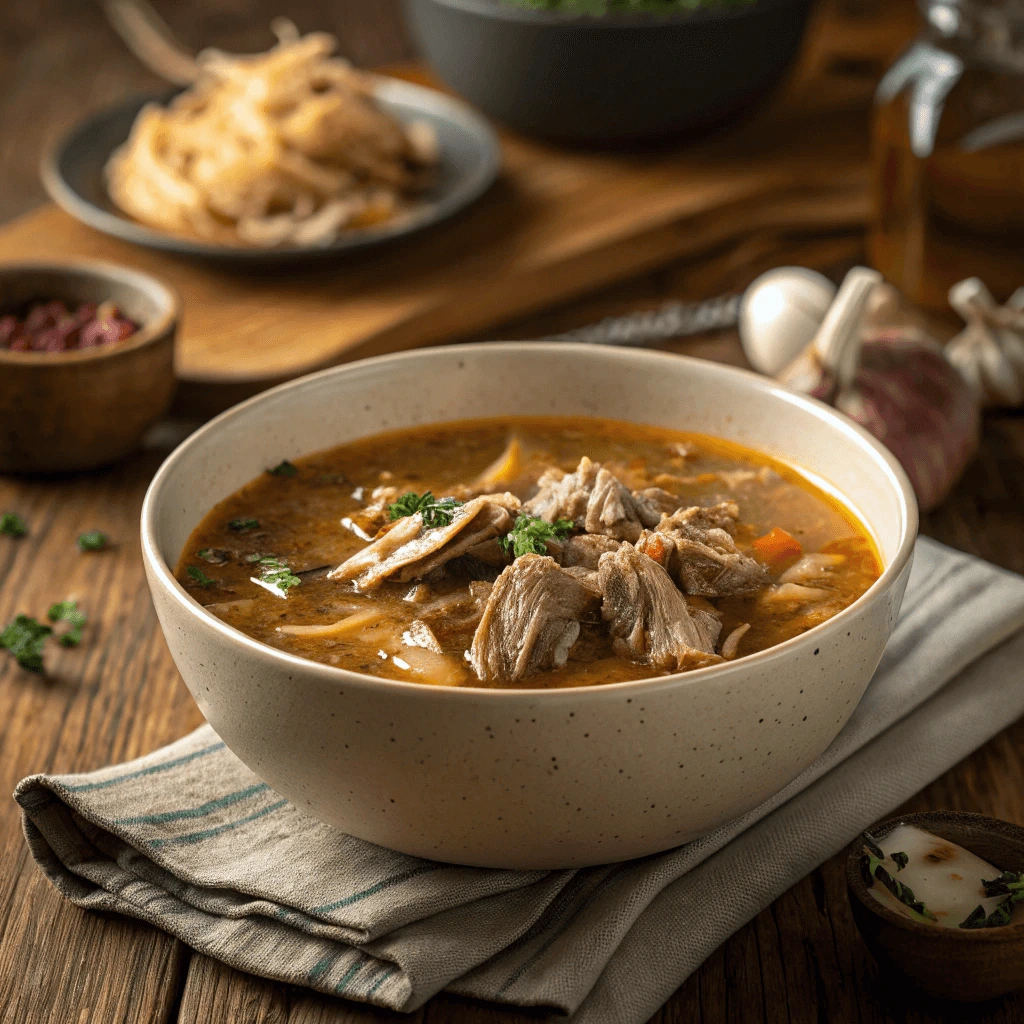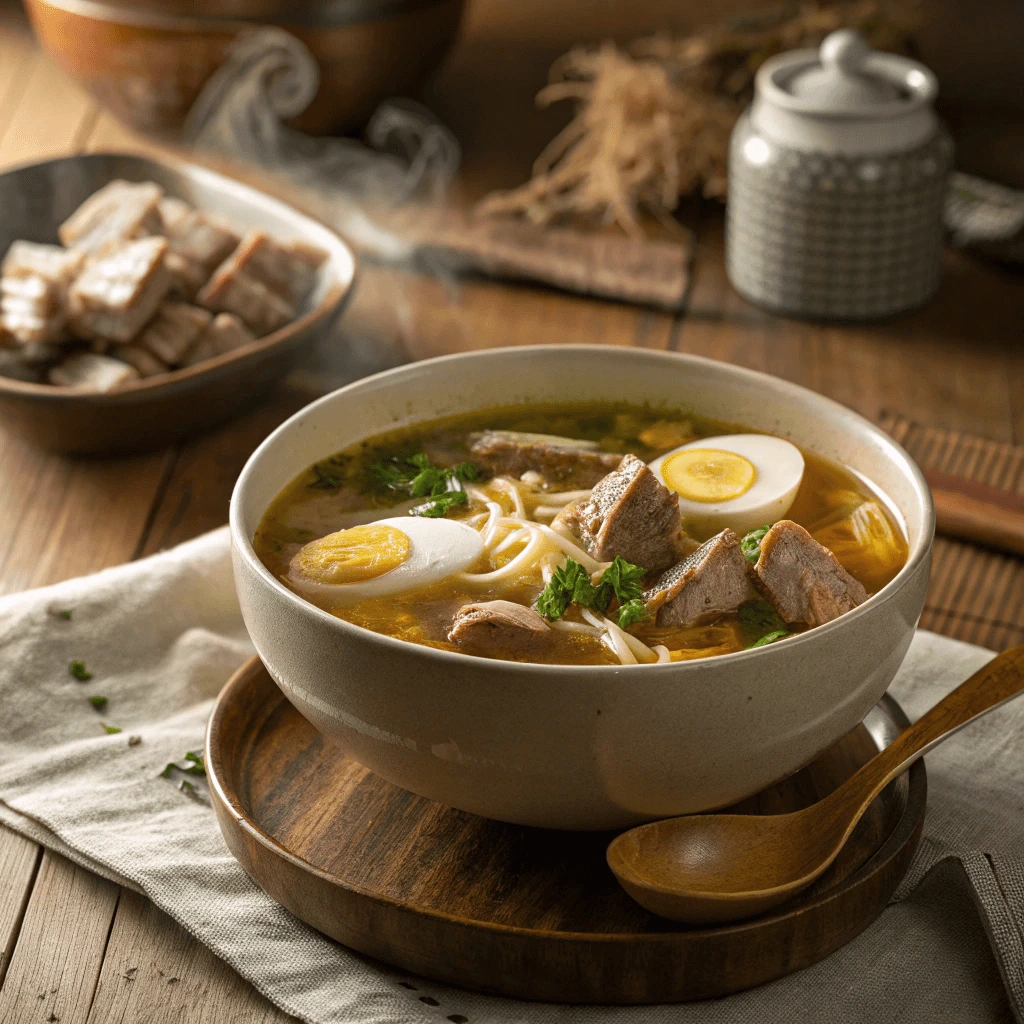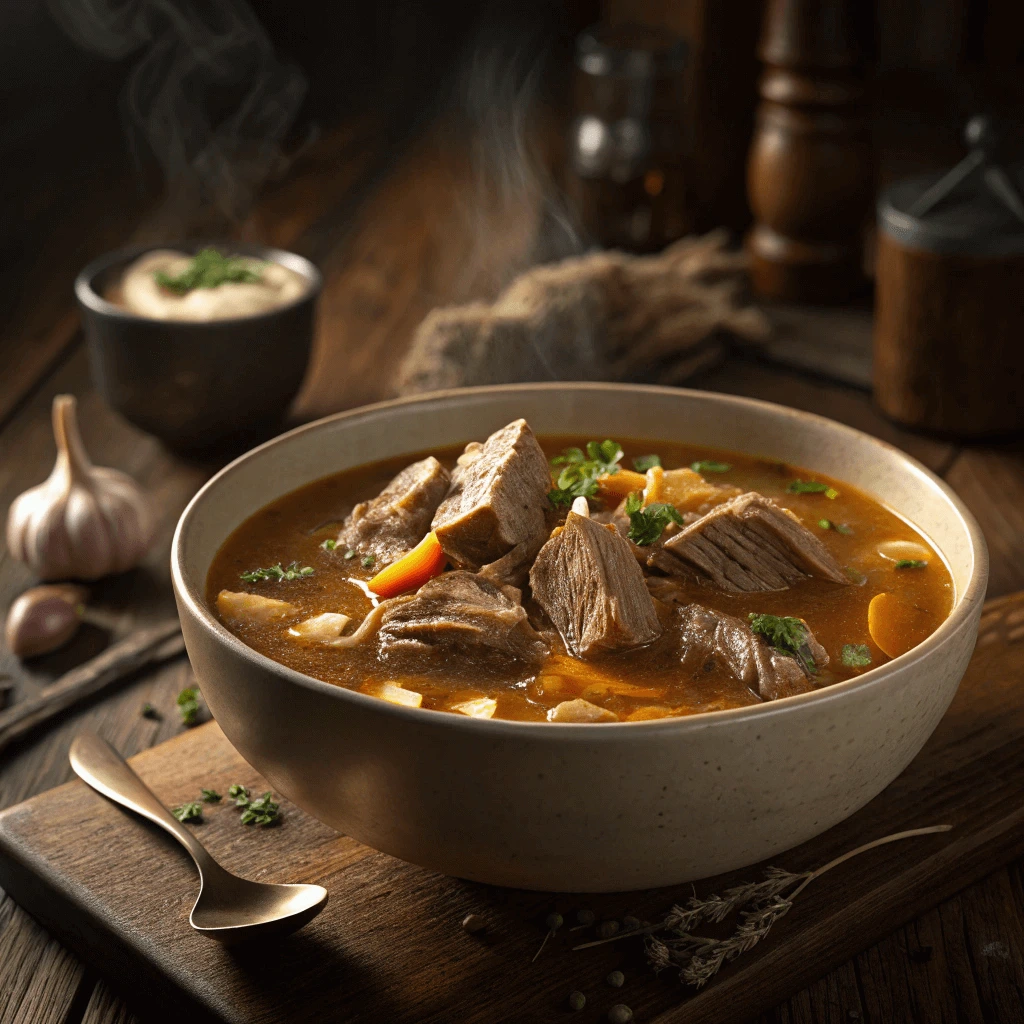If you’re following the carnivore diet and looking for a meal that’s both hearty and satisfying, soup is the perfect option. Packed with protein, healthy animal fats, and essential nutrients, the right soup can keep you full, energized, and on track with your low-carb lifestyle. Plus, it’s quick and easy to prepare, making it ideal for busy days when you want something nutritious without spending hours in the kitchen. In this post, we’ll explore the best carnivore diet soups that are not only delicious but also simple to make. From rich bone broth to meat-packed stews, these recipes will show you how to create soups that fit perfectly into your animal-based diet—all while keeping things flavorful and satisfying. Let’s dive in!
What Is the Carnivore Diet and Why Choose Carnivore Diet Soup?

Understanding the Basics of the Carnivore Diet
The carnivore diet is a straightforward way of eating that focuses only on animal-based foods. Unlike typical diets, it eliminates fruits, vegetables, grains, and sugars. Instead, you eat mostly meat, fish, eggs, and animal fats.
What Foods Are Allowed?
You can eat beef, chicken, fish, eggs, and animal fats like butter. Organ meats such as liver and kidney are especially important because they provide vitamins and minerals. Bone broth, made from simmering animal bones, adds collagen and nutrients that support joint and gut health.
Why Follow the Carnivore Diet?
People choose this diet to improve health and simplify their meals. Many report benefits like weight loss, clearer thinking, less inflammation, and better digestion. Since the diet is high in protein and fat, it helps keep energy levels steady and preserves muscle.
How Is It Different From Other Diets?
The carnivore diet removes all plant foods, even low-carb veggies, making it stricter than keto or paleo diets. This forces your body to use fat and protein for energy, often leading to ketosis—a natural fat-burning state. Many find ketosis helpful for sustained energy and appetite control.
Benefits of Meat-Based, Zero Carb Soups
Meat-based, zero carb soups bring many benefits, especially for those on the carnivore diet. These soups are filling, nutritious, and support your overall health.
High in Protein
These soups provide plenty of high-quality protein from beef, chicken, and organ meats. Protein helps build and repair muscles, supports your immune system, and keeps you energized throughout the day.
Nutrient-Rich and Collagen-Packed
Making soups with bone broth adds collagen and important minerals like calcium and magnesium. Collagen improves joint health, skin, and digestion. Organ meats also supply essential vitamins like vitamin A and B12, making your meal nutrient-dense.
Gentle on Digestion
Slow-cooked meat soups are easy to digest. Bone broth soothes the gut lining, which can help reduce inflammation and improve digestion for many people.
How Carnivore Diet Soup Supports Protein Intake and Gut Health
Carnivore diet soups help you get plenty of protein while supporting your gut health. Here’s how they work:
Easy Protein Boost
These soups use beef, chicken, and organ meats that provide all the essential amino acids your body needs. Eating soup makes it easier to enjoy different protein sources in one meal, which helps your muscles grow and repair.
Gut-Healing Bone Broth
Bone broth, often used in these soups, contains collagen and gelatin. These help repair and protect your gut lining, improving digestion and reducing inflammation.
Reduces Inflammation
Since these soups don’t include plant fibers or sugars, they are gentle on the gut and can lower inflammation. Many people find relief from digestive issues and food sensitivities when eating carnivore soups.
Key Ingredients for the Best Carnivore Diet Soup
Choosing Quality Animal Proteins
Selecting the right animal proteins is key to making a nutritious and satisfying carnivore diet soup. Quality ingredients not only improve the taste but also maximize the health benefits you get from your meal.
Why Quality Matters
Choosing high-quality meats means you get better nutrition and fewer additives or hormones. Grass-fed beef and pasture-raised chicken tend to have more omega-3 fatty acids and vitamins than conventionally raised animals. These nutrients support heart health, brain function, and overall well-being.
Beef: The Carnivore Staple
Beef provides a rich source of complete protein and essential nutrients like iron, zinc, and B vitamins. Cuts like ribeye, chuck, or brisket add flavor and healthy fats to your soup. Ground beef also works well for easy cooking and absorbs broth flavors nicely.
Chicken: Lean and Versatile
Chicken is a great option for lean protein in your soup. Use thighs or drumsticks for added fat and flavor. Chicken bones make excellent broth that adds richness and nutrients like calcium and collagen. You can easily combine chicken with beef for variety.
Organ Meats: Nutrient Powerhouses
Organ meats such as liver, kidney, and heart pack a nutritional punch. They provide vitamins A, B12, iron, and other minerals often missing in muscle meat. Adding small amounts of organ meats to your soup boosts nutrient density without overpowering taste.
The Importance of Bone Broth in Carnivore Soup
Bone broth is more than just a flavorful base for carnivore soups—it’s a nutritional powerhouse that supports joint, gut, and skin health. Whether you use beef bones or chicken carcasses, bone broth brings unique benefits to your carnivore diet.
What Makes Bone Broth Special?
When you simmer bones, marrow, and connective tissues for hours, the process extracts collagen, gelatin, and important minerals like calcium, magnesium, and phosphorus. These nutrients help maintain strong bones, healthy joints, and firm skin.
Unlike store-bought broths, homemade bone broth contains natural gelatin and amino acids like glycine and proline. These amino acids play a role in repairing tissue, boosting immunity, and supporting detoxification.
Gut Health Benefits
Bone broth supports gut health by nourishing the gut lining. The gelatin in broth coats the stomach and intestines, helping to prevent inflammation and improve digestion. Many people with food sensitivities or digestive issues find relief by regularly drinking bone broth.
Glutamine, an amino acid found in bone broth, helps repair and strengthen the gut lining. This makes it especially valuable for anyone healing from leaky gut or inflammation caused by a modern diet.
Why Use Both Beef and Chicken Bones?
Beef bones produce a rich, hearty broth packed with minerals and a deeper flavor, while chicken bones offer a lighter, more delicate broth that’s still full of nutrients. Combining both gives you a well-rounded base with a balance of flavor, fat, and healing properties.
You can use marrow bones, knuckles, or oxtails for beef broth, and chicken feet, wings, or carcasses for chicken broth. Both types add depth and nourishment to any carnivore soup.
Adding Healthy Fats and Collagen for Nutrient Density
Healthy fats and collagen-rich ingredients give carnivore soups the nutrient boost your body needs. They enhance flavor, support hormone function, and help your body absorb fat-soluble vitamins like A, D, E, and K.
Why Healthy Fats Matter
Fats fuel your body when you follow a zero-carb, carnivore diet. Ingredients like beef tallow, suet, and bone marrow are excellent sources of clean, animal-based fat. These fats provide long-lasting energy and support brain and heart health. Adding a generous amount of fat to your soup also helps you feel full and satisfied after eating.
When you choose fattier cuts of meat—like ribeye, brisket, or chicken thighs—you naturally add more fat to your meal. You can also stir in a spoonful of beef tallow or add marrow bones to boost the fat content.
The Role of Collagen and Gelatin
Collagen supports strong joints, skin elasticity, and connective tissues. It’s mostly found in bones, skin, and connective tissue. When you slow-cook bones in broth, the collagen breaks down into gelatin—a substance that gives your soup a silky texture and gut-healing benefits.
Gelatin also helps repair the gut lining and supports digestion. Many carnivore eaters notice better skin, hair, and joint comfort when they consistently consume collagen-rich soups.
Combining Fats and Collagen for Maximum Benefit
The best carnivore soups include both fat and collagen. Using bone broth as a base, adding fatty meats, and incorporating collagen-rich parts like oxtail or chicken feet creates a complete, nourishing meal. This balance not only improves nutrient density but also boosts flavor and texture.
Quick and Easy Protein-Packed Carnivore Soup Recipes

Simple Ground Beef and Bone Broth Soup Recipe
This ground beef and bone broth soup is quick, nourishing, and perfect for anyone following a carnivore or zero-carb diet. It uses minimal ingredients, focuses on protein and healthy fat, and delivers big flavor with little effort.
Ingredients You’ll Need
To make this soup, gather the following:
- 1 lb ground beef (grass-fed if possible)
- 4 cups beef bone broth (homemade or high-quality store-bought)
- 1 tbsp beef tallow or butter
- Salt to taste
- Optional additions: egg yolks, collagen powder, or organ meat (like liver, finely minced)
This ingredient list keeps the soup simple, but you can adjust it based on your taste and goals.
Step-by-Step Instructions
- Brown the ground beef: Heat a pot over medium heat. Add beef tallow or butter. Once hot, cook the ground beef until browned and fully cooked. Break it into small pieces as it cooks.
- Add bone broth: Pour in the bone broth and stir to combine. Bring the mixture to a gentle boil.
- Simmer: Reduce the heat and let the soup simmer for 10–15 minutes. This allows the flavors to meld and the broth to absorb some richness from the meat.
- Enhance (optional): For added nutrition, stir in egg yolks or a scoop of collagen powder just before serving. These additions boost both protein and healthy fats.
Tips for Best Results
Store leftovers in the fridge for up to 3 days; the flavor gets even better after sitting overnight.
Use homemade bone broth whenever possible—it’s richer in collagen and minerals.
Choose fattier ground beef (80/20 or 70/30) for a more filling, flavorful soup.
Hearty Chicken Thigh Soup with Collagen Boost
This collagen-rich chicken thigh soup is perfect for anyone on a carnivore diet who craves a comforting, protein-packed meal. Using bone-in chicken thighs and skin gives you extra nutrients and a natural collagen boost with every bite.
Ingredients You’ll Need
To prepare this hearty soup, gather the following:
- 4 bone-in, skin-on chicken thighs
- 5 cups chicken bone broth (homemade or high-quality)
- 1 tbsp chicken fat or butter
- Salt to taste
- Optional add-ins: chicken feet (for more collagen), egg yolks, or finely chopped liver
These ingredients create a flavorful base while boosting the collagen content naturally through bone and skin-rich sources.
Step-by-Step Instructions
- Sear the chicken thighs: Heat chicken fat or butter in a large pot over medium heat. Add the thighs skin-side down. Sear them until the skin turns golden brown. This step locks in flavor and fat.
- Add the broth: Pour in the bone broth. Make sure the thighs are mostly covered. Bring the liquid to a boil.
- Simmer gently: Reduce the heat and let the soup simmer for 30–40 minutes. The meat should become tender, and the skin will release collagen into the broth.
- Shred and serve: Remove the thighs, shred the meat, and discard the bones if you prefer a boneless soup. Return the meat to the pot. Optionally, add egg yolks or collagen powder for an extra nutrient boost.
Tips to Maximize Nutrition
- Add chicken feet or necks to increase the collagen level naturally. These parts break down beautifully in long simmering.
- Use pasture-raised chicken for better fat quality and higher nutrient content.
- Skim off excess fat if desired—or leave it in for extra energy and satiety.
Organ Meat Soup: Nutrient-Dense and Flavorful
Organ meats add serious nutrition to carnivore soups. They offer essential vitamins and minerals while creating a rich, bold flavor that complements other meats perfectly.
Why Use Organ Meats?
Liver, heart, and kidneys contain more nutrients per ounce than most other cuts of meat. They’re loaded with vitamin A, iron, zinc, B vitamins, and more. These nutrients support energy, brain function, and immune health.
Adding organ meats to soup is a smart way to enjoy their benefits without overwhelming your taste buds. When combined with ground beef or stew meat, their flavor becomes more balanced and easier to enjoy.
Simple Ingredient List
To make a basic organ meat soup, you’ll need:
- ½ lb beef or chicken liver (thinly sliced)
- ½ lb beef heart or kidney (chopped)
- 1 lb ground beef or stew meat
- 5 cups bone broth (beef or chicken)
- 1–2 tbsp beef tallow or butter
- Salt to taste
Optional: egg yolks or collagen powder for extra nutrition.
How to Make It
- Heat tallow in a soup pot.
- Cook the liver and heart until browned.
- Add ground beef and cook until done.
- Pour in the bone broth and bring to a boil.
- Simmer for 20–30 minutes.
- Stir in any extras like collagen or yolks just before serving.
This soup is warm, filling, and packed with nutrients your body will love.
Tips for Cooking the Perfect Carnivore Diet Soup

Best Cooking Techniques
Choosing the right cooking method helps bring out the best in your carnivore diet soups. Whether you’re simmering on the stove or using a kitchen appliance, each method offers its own benefits.
Simmering on the Stove
Simmering gives you great control and rich flavor. After browning the meat, add your broth and bring it to a light boil. Then reduce the heat and let it cook gently for 1–2 hours.
This method works especially well with bone-in cuts, organ meats, and tougher cuts that need time to soften. You’ll end up with a deep, flavorful broth and tender meat.
Cooking with a Slow Cooker
If you want a hands-off approach, the slow cooker makes it easy. Add all your ingredients, set it to low, and let it cook for 6–8 hours. The long, steady heat pulls nutrients from bones and softens even the toughest meat.
Slow cooking is ideal when you want to prep ahead and enjoy a nourishing meal later with minimal effort.
Using a Pressure Cooker
Need soup fast? A pressure cooker can give you similar results in less time. You can make most carnivore soups in 30–40 minutes. Use the sauté setting to brown the meat first, then lock the lid and let it cook under pressure.
This method saves time and still gives you a collagen-rich, flavorful soup.
How to Maintain Maximum Nutrients While Cooking
Cooking meat-based soups on the carnivore diet is not just about flavor—it’s about preserving the powerful nutrients your body needs. The way you prepare and cook your ingredients can either protect or destroy those valuable vitamins, minerals, fats, and proteins.
Use Gentle Cooking Methods
High heat can damage delicate nutrients like B vitamins and certain amino acids. Choose gentle cooking methods such as simmering, slow cooking, or pressure cooking. These techniques preserve more nutrients than boiling rapidly or searing at high temperatures for long periods.
Simmering for 1–2 hours helps draw collagen and minerals from bones without overcooking the meat. A slow cooker on low heat over several hours also protects nutrients while breaking down connective tissue for a rich, digestible soup.
Avoid Overcooking Meat
Cooking meat too long or at too high a temperature can cause nutrient loss and dry texture. Instead, aim to cook meat just until tender. Use a meat thermometer if needed. For soups, bone-in cuts tend to be more forgiving and provide added minerals when simmered slowly.
You can also cut larger chunks of meat into smaller pieces. This helps them cook evenly and quickly, which reduces exposure to prolonged heat.
Keep and Consume the Cooking Liquid
Much of the nutrition ends up in the broth—especially when using bones, organ meats, or skin. Don’t discard the broth! Drink it as part of your meal or save extra portions for later. You’ll get valuable gelatin, electrolytes, and fat-soluble nutrients in every sip.
Bonus tip: If you refrigerate your soup and a layer of fat forms on top, don’t throw it away. Reheat it with your broth or use it for cooking. It’s full of energy and fat-soluble vitamins.
Seasoning Ideas That Fit the Carnivore Diet
While the carnivore diet focuses on animal-based foods, you don’t have to sacrifice flavor. Seasonings can still enhance your soups without straying from the core principles of the diet. The key is to choose simple, natural options that won’t upset your digestion or add unnecessary carbs.
Stick to Animal-Based Flavor Enhancers
Animal fats and broths carry natural flavor. Use beef tallow, duck fat, butter (if tolerated), and bone broth as the foundation of your seasoning. These fats add richness and help carry flavor throughout the soup.
Salt is essential. Choose sea salt or Himalayan pink salt to support electrolyte balance and bring out the natural taste of meat.
Optional: Add collagen powder or gelatin to thicken your soup slightly and add a subtle umami boost.
Try Mild, Low-Impact Spices (If You Tolerate Them)
Some people on the carnivore diet choose to add limited spices—especially when starting out or transitioning from other diets. These are minimal and still allow your body to adjust.
Popular low-impact options include:
- Black pepper (in moderation)
- Garlic powder or onion powder (small amounts)
- Dried rosemary or thyme (tiny pinches)
Start with small amounts to see how your body reacts. If your goal is strict carnivore, it’s okay to skip these entirely.
Use Animal-Based Additions for Depth
Want a bolder, more layered taste? Try using:
- A splash of raw or fermented dairy (like heavy cream or kefir, if tolerated)
- Egg yolks for a silky texture
- Crumbled crispy chicken skin or seared liver bits for a topping
These additions keep your soup 100% carnivore-friendly while boosting flavor and texture.
How Carnivore Diet Soup Supports Your Health and Fitness Goals
Protein Macros and Muscle Building Benefits
One of the biggest advantages of carnivore diet soups is their rich protein content. When made with quality meats and broths, these soups offer optimal macronutrient ratios that support muscle repair, fat loss, and overall strength.
Why Protein Matters on the Carnivore Diet
Protein plays a central role in building and maintaining muscle. It supplies your body with essential amino acids that it cannot produce on its own. These amino acids help repair tissue, support hormone production, and strengthen your immune system.
Carnivore soup often includes high-protein ingredients like ground beef, chicken thighs, liver, or collagen-rich cuts. These proteins digest efficiently and provide a complete amino acid profile—perfect for anyone aiming to build or maintain lean muscle mass.
Ideal Macronutrient Balance
A well-formulated carnivore soup tends to have a high protein-to-fat ratio, especially when made with lean cuts and bone broth. However, you can adjust your macros easily by adding more fat (like butter, tallow, or egg yolks) if you need more energy.
For those who train regularly, this balance of protein and fat helps fuel workouts while supporting muscle growth and recovery. Most carnivore eaters find that a 1:1 or 2:1 ratio of fat to protein (by grams) works best for strength and satiety.
Muscle Growth Without Carbs
Contrary to common belief, you don’t need carbs to build muscle. Carnivore soups deliver the amino acids and dietary fat your body uses to fuel workouts and recover after training. They also keep insulin levels stable, which supports better nutrient absorption without unnecessary fat gain.
Because these soups are easy to digest and packed with collagen, they also help reduce joint inflammation and improve recovery—both crucial for anyone focused on strength training or muscle building.
Supporting Gut Health and Healing with Meat-Based Soups
Meat-based soups on the carnivore diet do more than satisfy hunger—they actively support gut healing and overall digestive wellness. By selecting nourishing animal-based ingredients and preparing them properly, you can promote a healthier, calmer gut.
Bovine Collagen and Bone Broth: Strengthening the Gut Lining
Bone broth made from beef or chicken bones is naturally rich in bovine collagen, a key structural protein that supports tissue repair. bovine Collagen helps strengthen the gut lining and may reduce irritation or inflammation, especially for those struggling with gut-related issues.
When you simmer bones for several hours, they release collagen and essential amino acids like glycine and proline. These nutrients help maintain the integrity of the intestinal wall and support smooth digestion.
Simple Ingredients for Easy Digestion
Carnivore diet soups typically avoid hard-to-digest ingredients like fiber, plant lectins, and sugars. Instead, they focus on clean animal proteins and fats. This simplicity reduces digestive stress and allows your gut to rest and repair naturally.
Using cuts like chicken thighs, beef shank, or liver provides your body with highly bioavailable nutrients—meaning they’re easy to absorb and gentle on your digestive system.
Reducing Inflammation Through Clean Eating
When you remove inflammatory foods and focus on clean animal-based meals, your gut often responds quickly. Soups made with slow-simmered meat, bones, and healthy fats support anti-inflammatory processes and help rebalance your microbiome.
Animal-based diets also avoid seed oils and refined carbs—two common triggers of gut discomfort and inflammation. As your digestive system heals, you may notice reduced bloating, less discomfort, and more consistent energy.
Staying Hydrated and Balancing Electrolytes on the Carnivore Diet
Proper hydration and electrolyte balance are essential for anyone following the carnivore diet. Since this way of eating eliminates carb-heavy foods that typically help retain water, your body flushes out fluids and electrolytes more quickly. By understanding how hydration works on carnivore, you can avoid fatigue, muscle cramps, and other common symptoms of electrolyte imbalance.
Why Hydration Is Different on a Zero-Carb Diet
When you cut carbs, your insulin levels drop. As a result, your kidneys start excreting more water and sodium. This natural diuretic effect means you may lose fluids and essential minerals like sodium, potassium, and magnesium faster than usual.
If you don’t replenish these elements consistently, dehydration and fatigue can set in—even if you’re drinking plain water. Meat-based soups offer a simple and effective way to stay hydrated while restoring your body’s balance.
How Carnivore Soups Help Replenish Electrolytes
Carnivore soups, especially those made with bone broth, naturally contain minerals pulled from bones during simmering. Bone broth provides:
- Sodium to help retain water and support nerve function
- Potassium for muscle contraction and heartbeat regulation
- Magnesium for energy production and muscle recovery
- Calcium for bone and nerve health
Drinking these soups daily allows you to hydrate and replenish vital electrolytes without adding any carbs or sugar. You can also season your soups with unrefined sea salt or Himalayan pink salt for an extra mineral boost.
Tips for Maintaining Hydration on Carnivore
- Drink bone broth regularly – at least once or twice a day
- Add salt to taste in soups and on your food
- Include fatty cuts of meat to help slow water loss
- Listen to your body – signs of imbalance include headaches, low energy, and muscle cramps
Conclusion
If you’re looking to fuel your body with clean, nutrient-dense meals, the Best Carnivore Diet Soup offers the perfect solution. These hearty soups support muscle growth, gut health, and hydration—without adding carbs or unnecessary ingredients. By using quality meats, bone broth, and healthy fats, you can enjoy a flavorful and satisfying meal every time. Whether you’re new to carnivore or a seasoned pro, crafting the Best Carnivore Diet Soup at home can help you stay energized, nourished, and on track with your health goals.
